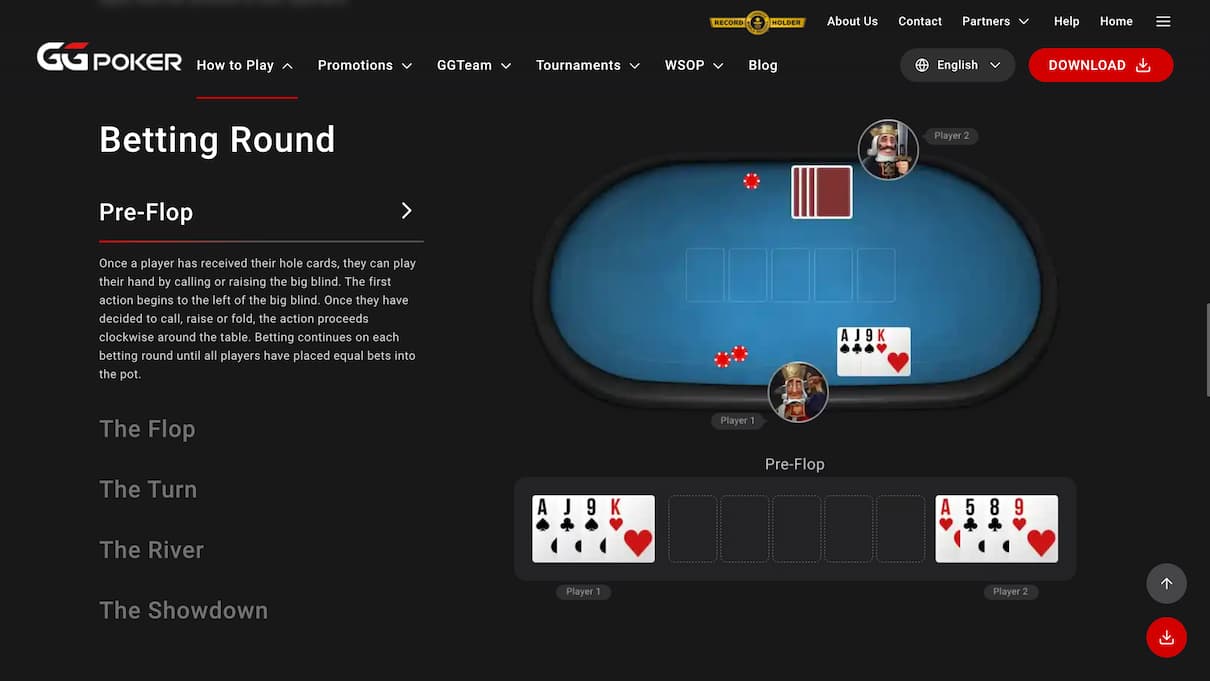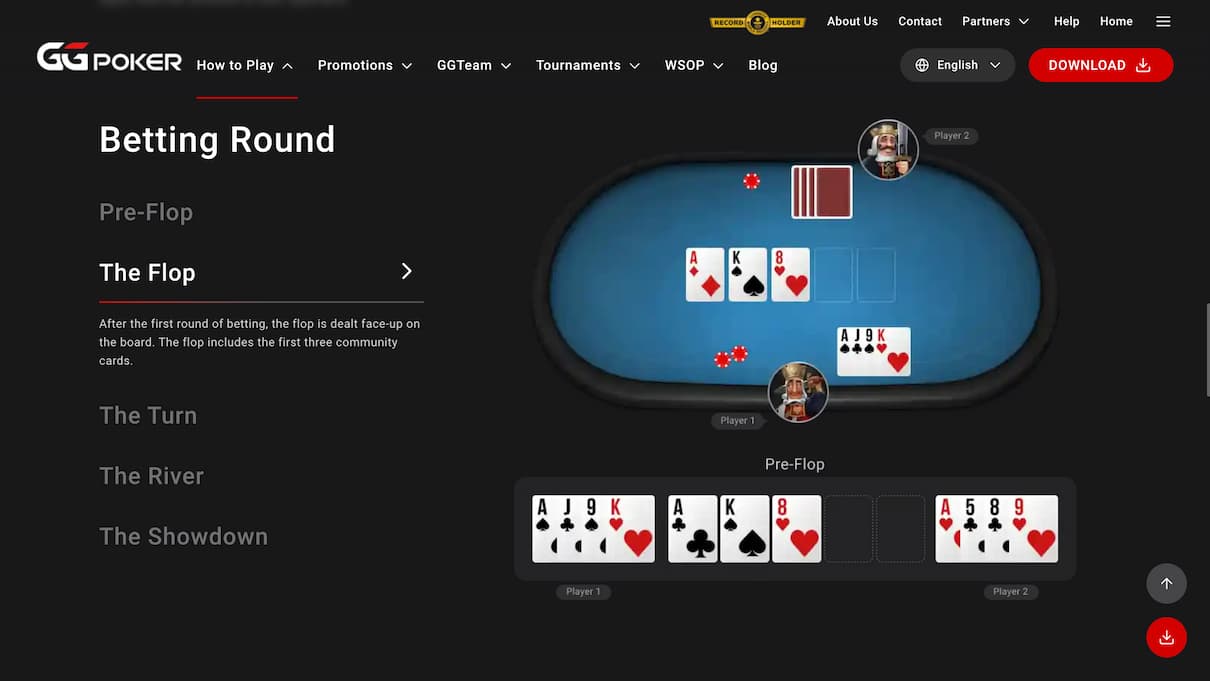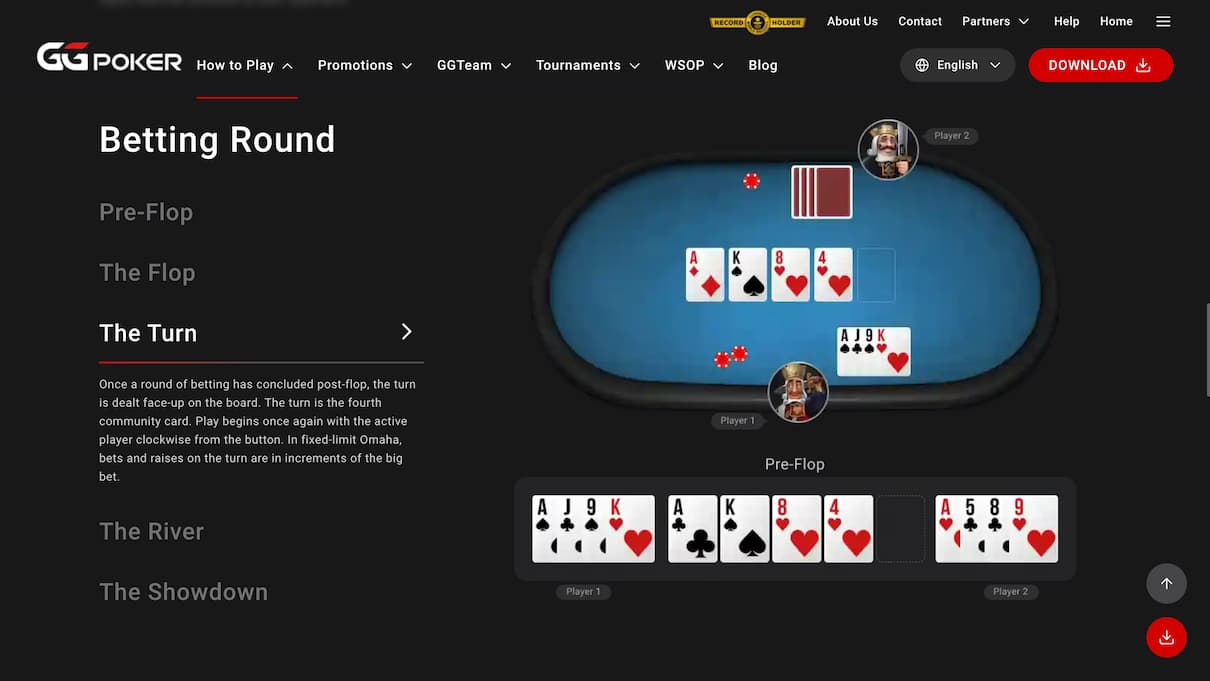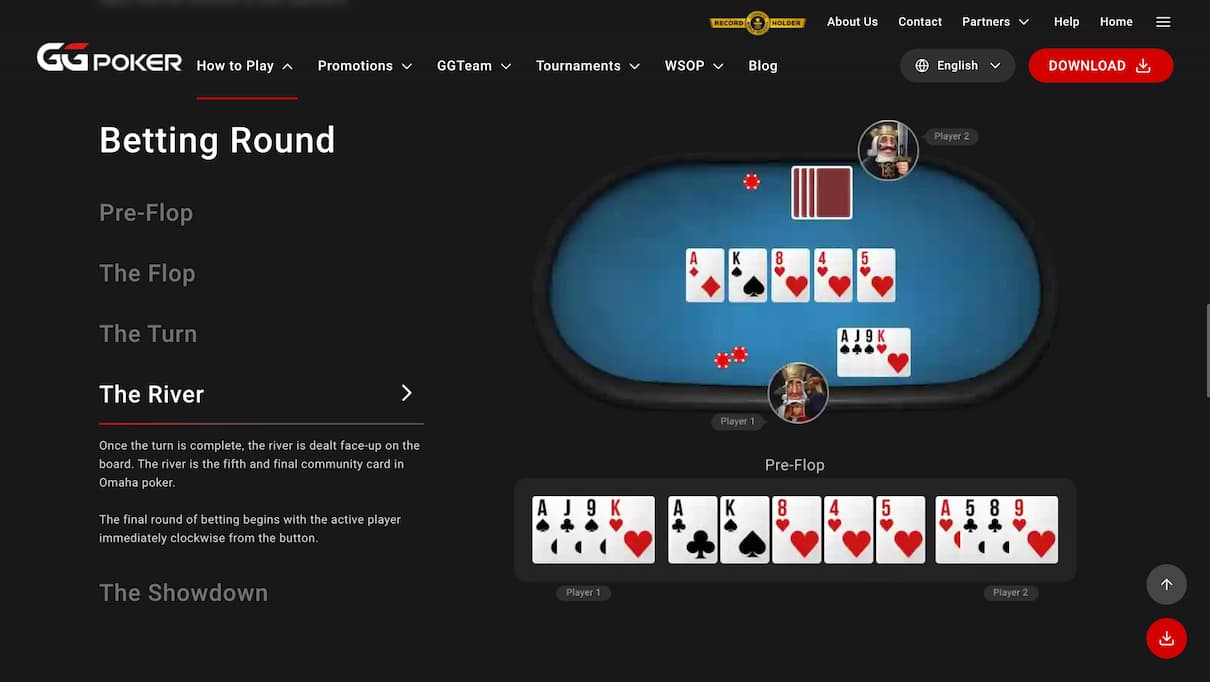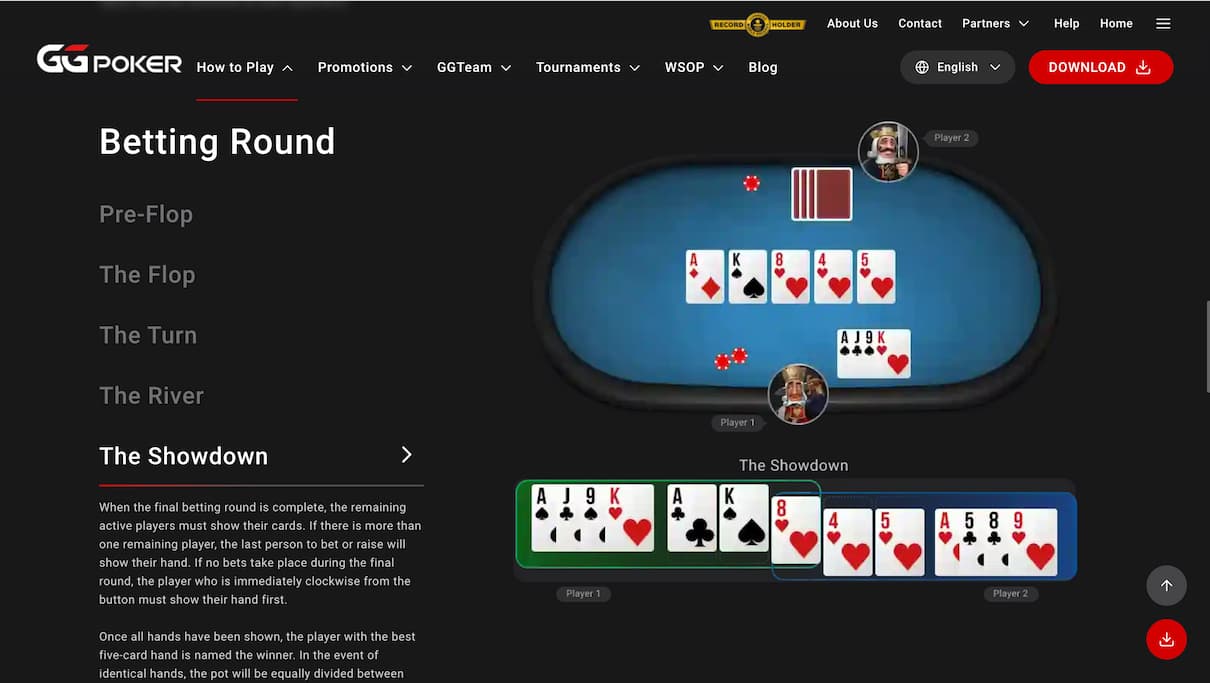Omaha Poker Rules – How to Play Omaha Poker
Omaha poker is a compelling variant that offers a fresh challenge to players looking to expand their experience beyond Texas Hold’em or classic poker. Omaha poker rules are simple to learn, but like other popular versions of this card game, they feature nuances requiring different strategies.
If you’re already familiar with casino card games, learning how to play Omaha Poker online shouldn’t take long. In addition to the rules and gameplay, you’ll learn about key differences between this variant and Texas Hold’em and how to play different versions of Omaha Poker.
What is Omaha Poker?
Omaha Poker is a community card game in which players must form the best five-card hand using precisely two hole cards and three community cards. This key rule differentiates this variant from other popular ones, such as Texas Hold’em and 7 Card Draw.
Popular in both pot-limit and no-limit formats, players learning how to play Omaha Poker are challenged by the need to adapt their existing strategies. This game presents an increased range of hand possibilities whilst retaining the ability to bluff and use other playing techniques.
Omaha Poker rules and relative gameplay complexity make it particularly appealing to experienced players. It’s for this reason that most players transition to it after learning how to play other variants, such as Texas Hold’em.
Poker Hands in Omaha
Some of the most basic rules of Omaha Poker revolve around the winning hands. If a game reaches the showdown, it’s the hand strength that determines the pot winner. The poker hand ranking list is identical to that of Texas Hold’em and other popular variants, but it’s worth reviewing once again before playing real money Omaha Poker.
| Strength | Poker Hand | Description | Example | Example Hand Descriptions |
| 10 | Royal Flush | The highest possible hand in poker | A♦, K♦, Q♦, J♦, 10♦ | Ace through Ten of Diamonds |
| 9 | Straight Flush | Five consecutive cards of the same suit | 7♠, 8♠, 9♠, 10♠, J♠ | Seven through Jack of Spades |
| 8 | Four of a Kind (Quads) | Four cards of the same rank, plus one unrelated card | 9♣, 9♦, 9♥, 9♠, 3♦ | Four Nines with a Three of Diamonds as a kicker |
| 7 | Full House (Boat) | Three cards of one rank and two cards of another rank | K♥, K♣, K♦, 3♠, 3♣ | Three Kings and a Pair of Threes |
| 6 | Flush | Five cards of the same suit, not in sequence | 2♠, 5♠, 8♠, 10♠, J♠ | All spades, not in order |
| 5 | Straight | Five consecutive cards of different suits | 4♦, 5♣, 6♠, 7♥, 8♣ | Four through Eight of mixed suits |
| 4 | Three of a Kind (Trips or Set) | Three cards of the same rank, plus two unrelated cards | Q♦, Q♠, Q♣, 5♥, 8♣ | Three Queens with a Five and an Eight as kickers |
| 3 | Two Pair | Two distinct pairs of cards, plus one unrelated card | J♦, J♣, 8♥, 8♠, 4♦ | A Pair of Jacks and a Pair of Eights, with a Four as a kicker |
| 2 | Pair | Two cards of the same rank, plus three unrelated cards | A♥, A♠, 7♦, 9♣, 10♠ | A Pair of Aces with unrelated kickers |
| 1 | High Card | A hand with no combinations, where the highest card determines the hand’s strength | K♠, 10♣, 7♥, 4♦, 2♠ | King-high |
Helpful Tip: Terms like kicker and mixed suits are common in poker language. It’s important to be familiar with the game’s terminology to understand what’s going on and how to make the most of a situation.
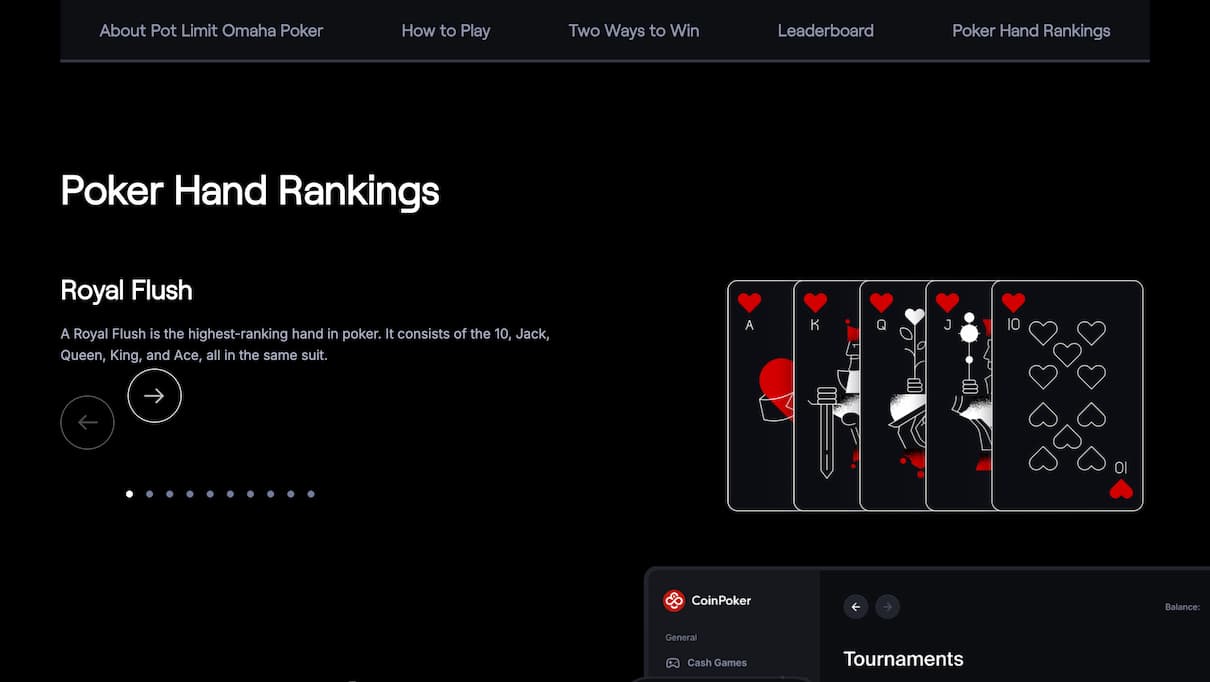
How to Play Omaha Poker
The best way to learn the rules for Omaha Poker is to go through a typical game. No matter if you’re playing a standalone cash game or are part of a poker tournament, these are the key stages of each game.
The Deal
The game begins with the small blind and big blind, forced bets placed by the two players sitting to the left of the dealer. The small blind is half the big blind, which is the minimum bet allowed in the game. After players place the blinds every participant receives four hole cards. They are dealt face-down so that only the intended player can see them. The dealer button, or position, rotates clockwise after each hand, ensuring all players take turns being in different positions.Pre-Flop Betting Round
The action starts with the player to the immediate left of the big blind, known as “under the gun” (UTG). This player can either fold, call the big blind, or raise within the pot-limit rules. The betting continues clockwise around the table, with each player having the same options. The round ends when all active players have matched the highest bet or folded their hands.The Flop
After the Pre-Flop betting round, the dealer places the first three community cards face-up in the centre of the table. This stage of the game is the Flop. These shared cards are available for all players to use when forming their best five-card hand. Another betting round begins, starting with the first active player to the left of the dealer. Players can check (if no bets are made), bet, call, raise, or fold, depending on the situation.The Turn
Once the flop betting round is complete, the dealer adds a fourth community card, known as the Turn, to the table. This card opens more possibilities for combinations, such as straights or flushes. Betting resumes, following the same structure as before, with the first active player to the dealer’s left initiating the action.The River
The final community card, called the River, is dealt face-up. By this point, players can see all five community cards on the table. Players now have complete information about potential hands and must decide their next move. A final betting round takes place, once again starting with the first active player to the left of the dealer.The Showdown
If two or more players remain after the River betting round, the Showdown determines the winner. Players reveal their hole cards and indicate the best five-card hand. According to the rules, there are exactly two hole cards and three community cards in each hand. If no one calls the last bet, the uncalled bettor wins without the Showdown. In the case of identical hands, all winners get an equal share of the pot.
Allowed Actions According to Omaha Rules for Poker
During the different betting rounds of Omaha Poker, you may take any one of two or more actions.
- Check: A check allows you to pass the action to the next player without placing a bet, as long as no one has bet during the current round.
- Bet: A player can bet by simply placing chips into the pot to start or increase the wager during a betting round.
- Call: Calling means matching the current bet made by another player to stay in the hand.
- Raise: Raising increases the current bet, forcing other players to call the higher amount, fold, or re-raise.
- Re-Raise: A re-raise occurs when you increase an already raised bet. This can escalate the size of the pot and test your opponent’s commitment, making it a popular way to bluff.
- Check-Raise: This advanced move involves checking initially to induce a bet from another player, then raising when the action returns to you.
- All-In: Going all-in means wagering all your remaining chips. This can happen when you’re confident in your hand or as a bluff.
- Fold: Folding means discarding your cards and exiting the hand. You cannot win the pot after folding.
Omaha Poker Rules vs Texas Hold’em Poker
Becoming a registered player at one of the UK’s top online poker sites gives you access to Omaha Poker, Texas Hold’em, and several other popular variants. While these games feature similar rules, they have subtle but significant differences. Below, we’ve compared the key features of the top two versions of poker that you can play against other players.
| Game Characteristic | Poker Omaha Rules | Rules of Texas Hold’em |
| Number of hole cards | Four | Two |
| Number of cards that can be used in a hand | 2 x hole + 3 x community | Any combination of hole and community cards |
| Pot formats | No-Limit, Pot Limit, and Fixed Limit | No-Limit, Pot Limit, and Fixed Limit |
| Popular variants | Hi-Lo, Five-Card Omaha | No-Limit Hold’em |
| Complexity | Higher | Medium |
| Best suited for | Players with some experience playing poker | All players, including first-time poker players |
Omaha Poker Rules for Hi-Lo
Omaha Hi-Lo (also known as Omaha 8 or Better) is a popular poker variant that splits the pot between the best high hand and the best qualifying low hand. This dual-purpose gameplay introduces unique strategies, making it a favourite for players who enjoy maximising their chances to win.
Omaha Hi Lo Basic Gameplay
The important Omaha poker Hi Lo rules you need to know before playing are:
- Starting the Game: Each player receives four private cards (hole cards). Five community cards are also placed, face-up, in stages during the Flop, Turn, and River. Just like classic Omaha poker rules, you must use exactly two of your hole cards and three of the community cards to form a hand for the Showdown.
- Splitting the Pot: Unlike traditional Omaha Poker, the pot is divided. The player with the best high hand and the player with the best low hand get an equal share. If no qualifying low hand exists, the high hand takes the entire pot. For a low hand to qualify, it must consist of five unique cards ranked 8 or lower.
- Betting Rounds: Betting follows the same structure as traditional Omaha, with four rounds: Pre-Flop, Post-Flop, Turn, and River. Betting is often done in a pot-limit format, where the maximum bet is equal to the current pot size.
- Low and High Hands: Omaha Hi Lo poker rules use the same hand rankings as regular Omaha poker. Royal Flush is the strongest and High Card is the weakest. The low hand must meet the “8 or better” rule to qualify. Straights and flushes do not disqualify a low hand, so the lowest possible hand is A-2-3-4-5 (known as a “wheel”).
- Dual Purpose Hands: A single hand can win both the high and low halves of the pot, a situation called “scooping.” For example, holding A-2-3-4-5 with the appropriate suits can form the best low hand and potentially a straight for the high hand.
List of Winning Hands According to Omaha Poker Rules for Hi Lo
To learn how to play Omaha Hi Lo poker, you must become familiar with the strongest as well as the weakest hands. This variant is one of the few games at UK online casinos where having the weakest hand can also lead to a prize.
| Strength | Hand Name | Example |
| 6 | 2-3-4-5-6 | 2♠, 3♦, 4♥, 5♣, 6♠ |
| 5 | A-3-4-5-6 | A♦, 3♠, 4♣, 5♥, 6♠ |
| 4 | A-2-4-5-6 | A♠, 2♦, 4♣, 5♥, 6♦ |
| 3 | A-2-3-5-6 | A♣, 2♦, 3♠, 5♥, 6♣ |
| 2 | A-2-3-4-6 | A♠, 2♥, 3♦, 4♣, 6♠ |
| 1 | A-2-3-4-5 (Wheel) | A♦, 2♣, 3♥, 4♠, 5♦ |
Helpful Tip: While it may feel counter-intuitive, Omaha Hi Lo poker rules allocate half the pot to the hand with the lowest strength. The Wheel is the overall weakest hand and cannot be beaten.
How to Play Omaha Poker Game Variants
The popularity of Omaha has given rise to numerous variations. The following are two of the most common ones you’ll come across in the United Kingdom.
Five-Card Omaha
Five-Card Omaha has very similar rules as Omaha Poker, but each player receives five hole cards instead of four. You must still use just two hole cards and three cards from the table to form your hand, but the introduction of a fifth hole card increases the number of possible combinations. This variant is more dynamic and requires additional strategic gameplay.
Courchevel
Courchevel is an Omaha Poker variant where the first community card is dealt face-up before the Pre-Flop betting round. This twist gives Omaha players an early glimpse of potential hand possibilities. Just like classic rules, each player receives four hole cards and must combine two of them with three from the community set to create a hand.
Basic Omaha Poker Strategy
There’s no Omaha Poker strategy guaranteed to deliver consistent wins since the game features lots of unpredictable variables. However, if you’re careful to notice opponent tendencies and act on them, you can use bluffing and other strategies to improve your odds.
Look Out for the Best Hands
In Omaha, hands that offer multiple ways to win, such as double-suited connectors or paired Aces, have higher potential. Avoid playing single-purpose hands like unsuited, unconnected cards, as they are less likely to compete successfully.
Adopt a Positional Strategy
Position is crucial due to Omaha Poker rules and the need to evaluate opponents’ actions. Play tighter in early positions and expand your range when acting from late positions to take advantage of more information.
Practice Responsible Bankroll Management
Omaha is a high-variance game, so set a budget for your session and stick to it. Avoid chasing losses and always wager within your means to ensure gambling remains enjoyable and sustainable. Practice safer gambling to keep playing fun and avoid overly stressful situations.
Watch Out for Counterfeiting
Low hands, especially in Omaha Hi-Lo, can be vulnerable to counterfeiting when a duplicate card appears on the board. For instance, if your low draw relies on A-2, and another Ace or Two appears, your hand may weaken significantly. You must, therefore, plan your bets accordingly.
Know When to Fold
Pro Tips to Learn How to Play Omaha Poker and Win
Now that you’ve read our Omaha Poker how to play guide, have a look at the following tips that can help you win games more often while reducing potential losses.
- Pay Attention to Starting Hand Selection: A starting hand in Omaha often includes combinations like double-suited connectors or high pairs. Avoid playing marginal hands, as the increased number of possible combinations makes weak starting cards less viable.
- Understand the Two-Card Rule: Always remember that you must use exactly two hole cards and three community cards to form your hand. This rule eliminates the possibility of playing the board or using all four hole cards, so plan your hand-building strategy carefully.
- Your Position is Key: Acting last gives you valuable information about your opponents’ intentions and allows you to make better decisions. Use a late position to control the pot size, bluff effectively, and extract value from your strong hands.
- Avoid Overvaluing Draws: With four hole cards, many hands may seem promising due to multiple draws, but not all will materialise. Focus on drawing hands with multiple outs and avoid chasing draws that offer limited chances of success. This should help you to conserve your bankroll and play responsibly.
- Play Tight-Aggressive: In Omaha, like in any other poker variants, playing too many hands can lead to significant losses due to the high variability of the game. Stick to strong hands Pre-Flop and bet aggressively when you have a clear advantage to maximise your winnings.
Other Helpful Poker Playing Guides
Use our detailed and insightful guides to discover other popular poker variants and learn about top strategies and important terms.
- How to play poker – Revisit the basics of the game, including basic strategy and rules.
- Texas Hold’em rules – Start playing the world’s most popular poker version proficiently.
- Poker terms – Find out what common poker words and phrases, including ones used in this guide, mean.
- How to play 5 Card Poker – Master the fundamentals of five-card variants, including 5 Card Stud.
- How to play 3 Card Poker – Enjoy a leading, casino-style poker variant featuring three-card hands.
- Poker rake – Learn the essentials of poker rake and why it’s crucial for bankroll management.
Conclusion
Omaha Poker rules are well suited for strategic gameplay and reward players who embrace their complexity. Whether you’re exploring classic Omaha or variants like Hi-Lo or Five-Card Omaha, understanding the mechanics and strategies is key to success.
If you’re eager to dive in, take the time to learn how to play Omaha Poker properly, and you’ll find it both challenging and fun to play. With practice and patience, you can develop the skills to compete confidently at any table, both online and in person.

